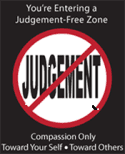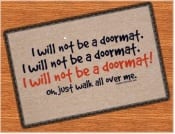We need to talk about your parents.
This is NOT about blame, I’m NOT suggesting we look at your parents in order to lay blame at their door for whatever has happened in your life.
Maybe there’s cause for blame, maybe there isn’t. Let’s not go there. You see, we’re in the business of making your life better, not bitter. So creating a nice big pile of blame and leaving at your parents’ door won’t serve any useful purpose… unless you want to; in which case, feel free. Nobody has the right to judge you.
And that’s such an important statement that I’ll say it again, accurately this time:
 Nobody has the right to visit their judgement on you. Whatever course you choose for yourself, Nobody Has The Right To Visit Their Judgement on YOU. (They will judge, of course. But that doesn’t make it right.)
Nobody has the right to visit their judgement on you. Whatever course you choose for yourself, Nobody Has The Right To Visit Their Judgement on YOU. (They will judge, of course. But that doesn’t make it right.)
As regards your parents, they taught you right and wrong. They probably wanted the best for you – although they may not have – and, in their own way, they probably tried to equip you to deal with a difficult world.
More to the point, they tried to equip you to deal with their difficult world. Because the chances are that, one way or another, they were fairly damaged people.
When you stop to think about it, you didn’t come out of a vacuum, did you?
If your upbringing was anything like mine, it probably felt like a void. There may well have been a void where you would have liked love, and support, and unconditional acceptance to be.
(Notice that I don’t say: “Where the love, and support, and unconditional acceptance SHOULD have been”, because I question that. Maybe you should too. Ask yourself: “in the light of the reality, of the family that I had, could love and support, and unconditional acceptance have been there?” If the answer is a “No”, or even an “Er…”, then there’s absolutely no point beating yourself around the head any more with The Big Should Stick, is there? Among the gifts that my parents couldn’t offer me were a bearable singing voice, and unconditional love. For different reasons, neither was part of their make-up.)
But let’s agree that your parents were of the opinion that there was a Hostile,  Dangerous World Out There, and your best hope of surviving was to be nice, selfless, and… supine. Or, to put it as simply as possible: they taught you that the best course was to be a sweet-natured doormat in your relationships.
Dangerous World Out There, and your best hope of surviving was to be nice, selfless, and… supine. Or, to put it as simply as possible: they taught you that the best course was to be a sweet-natured doormat in your relationships.
So, you learned to be an Emotional Charity Child. You may have hoped for more, but you learned to expect little or nothing, and be very grateful for whatever you got.
But let’s think a little further: for their own reasons, your parents truly believed in The Hostile, Dangerous World Out There. Most likely, they didn’t really feel that great about themselves, or the consideration they could expect. That meant they really needed you to be – and behave – in a certain way, to make them feel good about themselves.
To sum up, do you begin to see what a disempowering training ground that was for you?
You learned that:
- your parents understood the way The World worked, while you did not
- unconditional love and support were simply not on offer for someone like you
- the world was a very unsafe place
- you couldn’t hope to learn how to take care of yourself
- the world was a very unequal place – and you were less equal than most
- as a girl, being nice and submissive was your only survival strategy
- being assertive, or angry, were unfeminine, unattractive, and dangerous
Your parents probably did the best job they knew how to do. That didn’t necessarily make it very good. But that’s best consigned to history now.
The truth is, you’ve moved beyond that. If you have children, I’m betting you don’t bring them up the way your parents brought you up. You don’t want your children to live by those crazy, misguided rules. And if you don’t have children, you’ve still thought enough to know that their world view was… misguided, at best.
Which means you’ve actually moved beyond all of that. It’s still a part of your ‘programming’, but you don’t really believe it. That’s why you often feel so conflicted.
Maybe you don’t really believe you can shed that old, useless programming. Trust me, you can. Your life will be much, much happier – and easier – when you do. That’s when, like my lovely client Wanda, you start to feel a new awakening to Life. Wanda says: “I can do this now, Annie. I am learning how to do this. Each day holds some new discovery. Thank you for doing the work you do and doing it with such a loving spirit. Healing feels the way I imagine it is for a small bird taking its first flight.”

Annie Kaszina, international Emotional Abuse Recovery specialist and award-winning author of 3 books designed to help women recognise and heal from toxic relationships so that they can build healthy, lasting relationships with the perfect partner for them, blogs about all aspects of abuse, understanding Narcissists and how to avoid them and building strong self-worth. To receive Annie’s blog direct to your Inbox just leave your details here.
The 5 Simple Steps to Healing from Narcissistic Abuse
Over the next 5 days, I'll send you some lessons and tips that I've found have really helped women to heal from narcissistic abuse. Starting with the basics.



